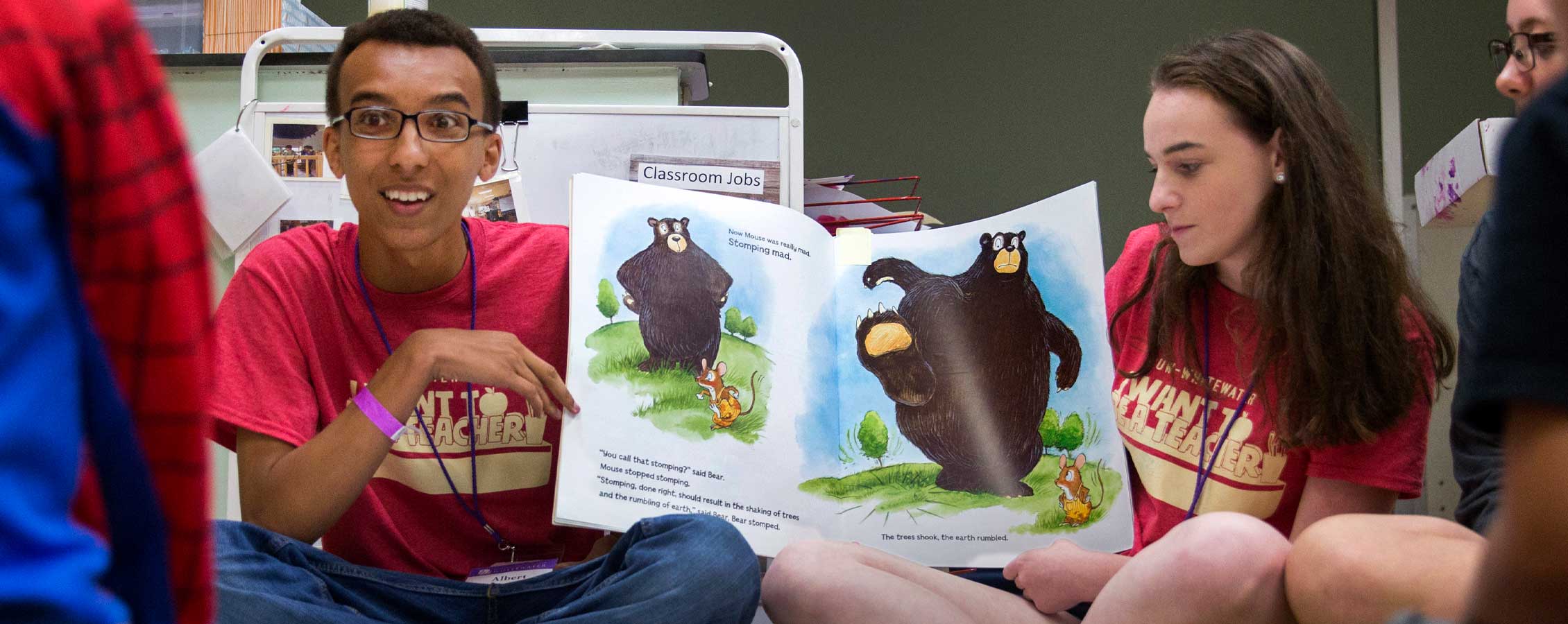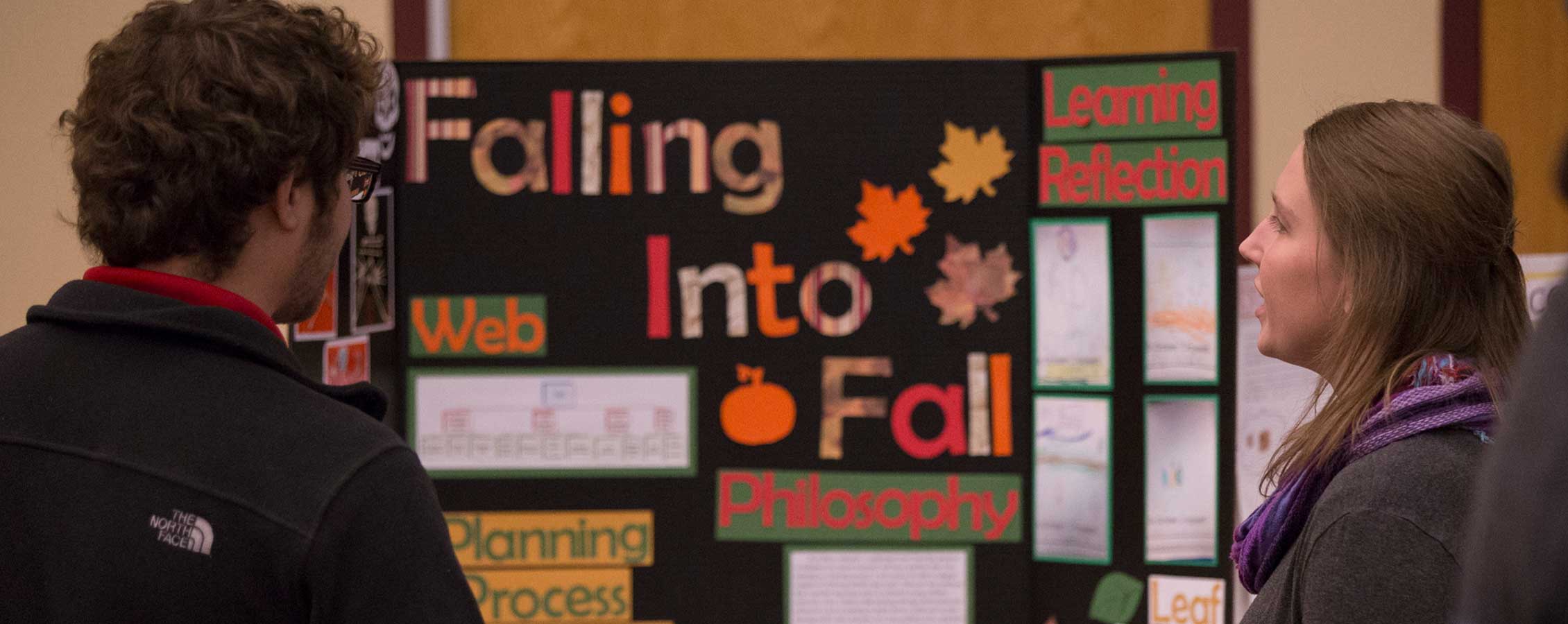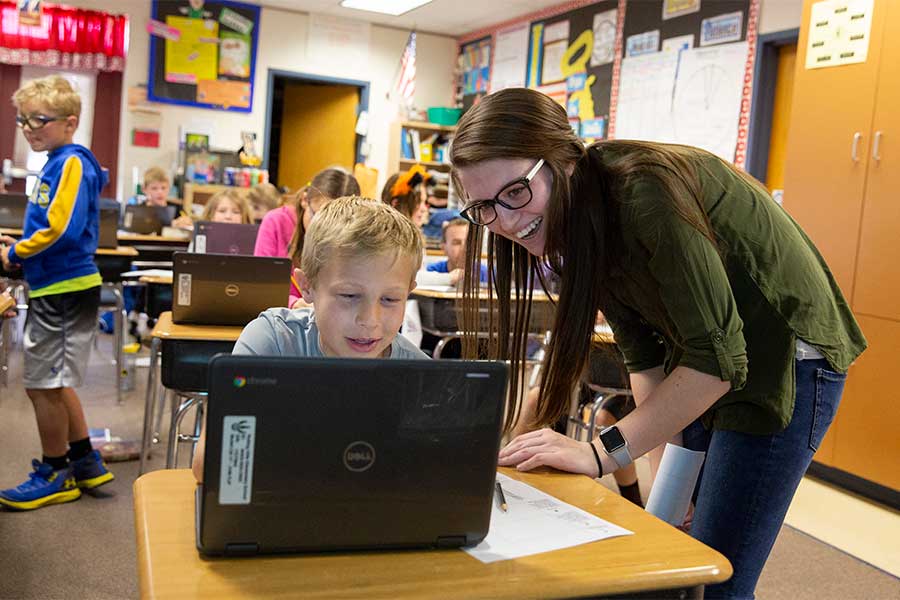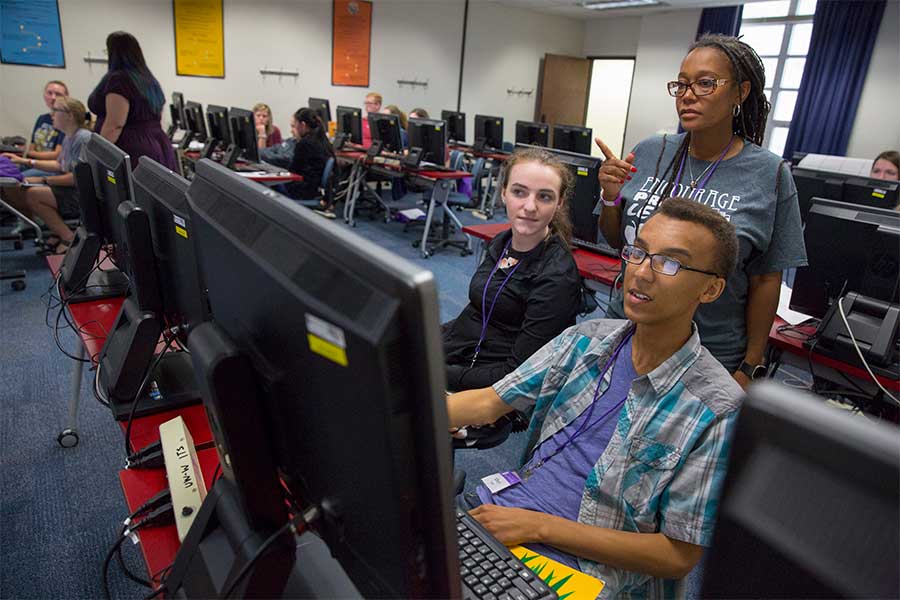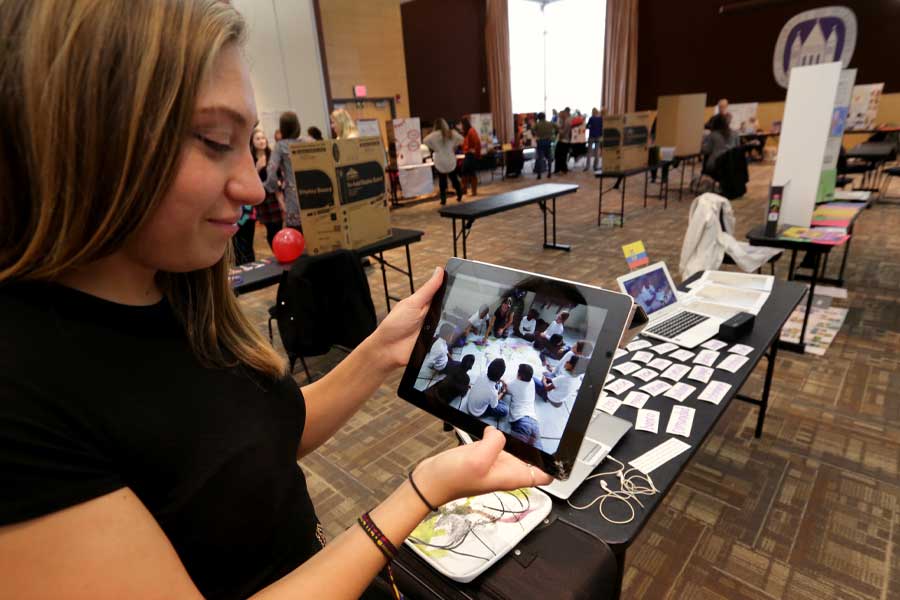EARLY CHILDHOOD PROGRAMS
Degrees, Licenses and Certificates
There’s no more important job in the world than teaching, caring for and mentoring the youngest generation. At UW-Whitewater, we deeply share your calling and commitment to nurture children.
Our Early Childhood program offerings include bachelor's degrees with options to specialize, from dual licensure to non-license. Looking for flexibility? We have options to learn in person or online. Whether you’re passionate about supporting diverse learners or incorporating nature-based learning into your teaching, we have add-on credentials for you to personalize your education. Dive deeper into the field of early childhood education with our high-quality and experiential master’s degree.
Get started on your journey by exploring the options below to learn more.
Program Vision, Goals, and Data
Mission Statement, Framework, and Outcomes [PDF]
Retention and Graduation Data [PDF]
UWW Early Childhood Education Graduate Job Placements [XLS]
Add-on licenses
Have you already earned a Wisconsin teaching license? Broaden your education and make yourself more marketable with one of our high-quality add-on licenses.
Credential certificates
If you’re looking to specialize, we offer credential certificates — bundles of courses on specific topics that last eight weeks per course.
Course 1 | EARLYCHD 332 – What is Culturally Responsive Teaching
This course will require students to explore the historical context of racism and discrimination, reflect deeply on their own identity, culture, intersectionality and biases, and begin to consider steps they can take toward growth.
Course 2 |EARLYCHD 334 – Building on the Assets of Families and Cultures
Throughout this course, students will learn about how to build on the assets of diverse families. They will learn how to engage families while respecting their different backgrounds, welcome families and solicit their involvement so teachers and families can work collaboratively in the best interest of their child.
Course 3 | EARLYCHD 336 – Culturally Appropriate Interactions and Guidance
Throughout this course, students will learn about culturally appropriate interactions and guidance for young children. Students will explore their own biases; reflect on their intentional and unintentional beliefs that lead to their responses when working with children from backgrounds different from their own. Students will also begin to recognize the disparity of equity that may impart a cumulative emotional and historical trauma across generations while learning how to interact and guide children that may be affected by such.
Course 4 | EARLYCHD 338 – Authentic Curriculum that connects with Children (Capstone)
Throughout this course, students will learn about the importance of creating curriculum that connects with children from diverse backgrounds. Students will also explore their role as leaders in the classroom and their program in creating a culturally competent environment for children and families. Students will create a capstone project as a summative assessment intended to demonstrate and display what they have learned throughout the four courses comprising this credential.
How to apply:
If you are NOT enrolled in the major, you must apply to UW-Whitewater as a Special/non-degree student. If you are already enrolled in the Early Child Care and Education major, simply email edonline@uww.edu with your name, UW-Whitewater ID number and the name of course(s) you wish to take.
Course One | EARLYCHD 320 – Introduction to Dual Language in Early Childhood
As the first course in the Supporting Dual Language Learners Credential, this course provides a historical overview of dual language programs in the United States and offers evidence to support the importance of home language maintenance in a dual language setting. It provides a foundation for understanding dual language learners, as well as strategies to effectively meet the needs of dual language learners in an early childhood setting, including classroom environments, teaching recommendations, and methods of assessment.
Course Two | EARLYCHD 322– Components of a Quality Dual Language Program
As the second course in the Supporting Dual Language Learners Credential, students will learn about the components of a quality dual language program, including assessment and accountability, curriculum, instruction, classroom environments, staff quality, program structure, family and community involvement, and support and resources. Students will investigate and evaluate each component and how it affects dual language learning.
Course Three | EARLYCHD 324 – Supporting Language Acquisition in Early Childhood Dual Language Learners
As the third course in the Supporting Dual Language Learners Credential, students will develop understanding about the characteristics of an effective teacher of children who are dual language learners. Students will learn and apply strategies to effectively support all dual language learners in an early childhood setting from infancy to preschool.
Course Four | EARLYCHD 326 – Assessment of Dual Language Learners in Early Childhood
Throughout this final Capstone course, students will learn about the components of a quality dual language program, including assessment and accountability, curriculum, instruction, classroom environments, staff quality, program structure, family and community involvement, and support and resources. Students will investigate and evaluate each component and how it affects dual language learning.
How to apply:
If you are NOT enrolled in the major, you must apply to UW-Whitewater as a Special/non-degree student. If you are already enrolled in the Early Child Care and Education major, simply email riversc@uww.edu with your name, UW-Whitewater ID number and the name of course(s) you wish to take.
EARLYCHD 400 | The Personal Dispositions of a Leader
This is the first of four courses and will cover definitions of leadership and leader roles, the role of vision, emotional intelligence, resilience, optimism, and reflective practice in successful leadership of early childhood programs. For credentialing, it is required that the Leadership Credential courses must be taken sequentially, however this course can be taken individually.
EARLYCHD 401 | Leading in your Program
This is the second of four courses in early childhood leadership. Through this three-credit course, students in early education will cover the leadership roles, responsibilities, and skills necessary for excellence in early childhood programs. Various leadership models will be presented. The role of leadership in staff development will be examined, including coaching and mentoring. Overarching themes include the importance of excellence, equity, inclusion and belonging in early care and education programs, and the role of vision and reflective practice in reaching these goals. For credentialing, it is required that the Leadership Credential courses are taken sequentially, however this course can be taken individually.
EARLYCHD 402 | Leading in your Community
This is the third of four courses in early childhood leadership. This course will cover the leadership skills necessary to go beyond individual programs to leadership in communities and in the profession. The focus will be on collaboration, interconnections, relationships, transformation and advocacy. Overarching themes include the importance of excellence and diversity in early childhood programs, and the role of vision and reflective practice in reaching these goals.
EARLYCHD 403 | Leading for Change
This is the fourth of four courses in early childhood leadership. This course will cover the use of transformational leadership, theories on change, action research, and strategies for successful advocacy. As the final course in the leadership series, students will participate in a research project to effect change. Overarching themes include the importance of excellence and diversity in early childhood programs, and the role of vision and reflective practice in reaching these goals.
This course requires the student to complete a major project that demonstrates the ability to integrate and apply the knowledge and skills taught in the first five courses as described in Project Preparation Guide, from The Registry.
How to apply:
If you are NOT enrolled in the major, you must apply to UW-Whitewater as a Special/non-degree student. If you are already enrolled in the Early Child Care and Education major, simply email riversc@uww.edu with your name, UW-Whitewater ID number and the name of course(s) you wish to take.
EARLYCHD 341 | Introduction to Nature-Based Early Childhood Education (NBECE)
This is course one out of four in a series which must be taken in sequence to earn a certificate or credential, or can be taken individually. Nature-based early childhood education has its roots in early childhood education and environmental education. Understanding the foundation and history of both will help support this new profession that integrates these two varied disciplines. This course will introduce students to the field of nature-based early childhood education including its history, theories, benefits for children, the variety of programs possible, the teacher’s role, high quality practices, and resources available.
EARLYCHD 342 | Exploration of Nature-Based Early Childhood Curriculum and Assessment
This is course two out of four in a series which must be taken in sequence to earn a certificate or credential, or can be taken individually. This course is designed to help students develop a deeper understanding of what a Nature-Based Early Childhood (NBEC) curriculum entails as well as how to unite early childhood learning standards with age-appropriate nature content. Students will explore how a Nature-based curriculum supports the developmental domains of early childhood. They will also evaluate different approaches to assessment in a NBED classroom while examining the relationship between assessment and curriculum.
EARLYCHD 343 | Navigating the Benefits, Risks, and Challenges in Nature-Based ECE
This is course three out of four in a series which must be taken in sequence to earn a certificate or credential, or can be taken individually.There are enormous benefits to nature-based play and learning – for children, teachers, administrators and families. With these benefits, as with all things, come risks and challenges. As the adults in children’s lives, it is up to us to seek and understand the benefits and to mitigate and manage the risks and challenges.
This course looks at the benefits of nature-based early childhood programming and how nature-based environments support children’s learning and development. The course explores benefit and risk assessment, regulations, the role of teachers and management and the importance of shared vision and principles.
EARLYCHD 344 | Designing for and Implementing Nature-Based Early Childhood Learning
This is the fourth course in the four-course series; it must be taken last and cannot be taken individually. This course will be implementation focused, providing students the opportunity to integrate what they have learned in the previous 3 courses through planned projects.
While nature-based early education topics will be reviewed; primary course content will aim to help students plan and carry out projects implementing the provision of nature-based early childhood education.
Students will explore aspects of nature-based early learning to determine the character and scope of action project they will undertake. They will learn about proposal writing and project management, creativity and problem solving, and various other things, depending on the scope and character of their action project.
Students will prepare project proposals for, 1) a course project to be completed at the end of the scheduled course, and, 2) an action project that will be submitted to authorities or partners.
As part of their course project, students will do the necessary research, analysis, planning and decision making to determine and propose actions required to achieve their action goals. This will take the form of an action project proposal to be presented to initiate implementation and as completion of the course.
How to apply:
If you are NOT enrolled in the major, you must apply to UW-Whitewater as a Special/non-degree student. If you are already enrolled in the Early Child Care and Education major, simply email Anne Tillett at tilletta@uww.edu with your name, UW-Whitewater ID number and the name of course(s) you wish to take.
EARLYCHD 354 | Introduction to Program Development
This first course in a series of four provides an overview of definitions, roles, responsibilities, and ethics involved in program development and sets the context for the other three courses. Students explore what it means to develop and implement a high-quality early care and education or youth care program. The course includes the application of the Wisconsin Model Early Standards or your state’s Early Learning Standards to guide expectations for supervisory and teaching staff and support continuous quality improvement. The content is intended for those in positions that involve program development, implementation, and supervision such as directors, assistant directors, lead teachers, family childcare providers, program coordinators, site coordinators, and group leaders.
EARLYCHD 355 | Observation, Assessment and Evaluation
This is the second of four courses in a series of four. This course includes discussions and practical application of techniques and tools for observation, assessment, and evaluation of individual children, curriculum, learning environments. Systems for planning, goal setting, and monitoring provide continuous information on the quality of the program, educators, and child outcomes. The course meets the requirements for Wisconsin Model Early Standards, or your state’s Early Learning Standards which is used to guide expectations for supervisory and teaching staff and support continuous quality improvement. The content is intended for those in positions that involve program development, implementation, and supervision such as directors, assistant directors, lead teachers, family childcare providers, program coordinators, site coordinators, and group leaders.
EARLYCHD 356 | Designing Environments for Learning
This is the third course in the Program Development Credential. Environments are both physical and cultural and are an important part of producing excellent quality programs. They reflect the program’s philosophy and either assist or hinder children’s learning.
This course uses the Wisconsin Model Early Standards, or your state’s Early Learning Standards as a framework for program quality and for both supervisory and teaching staff expectations. The content is intended for those in positions that involve program development, implementation, and supervision such as directors, assistant directors, lead teachers, family childcare providers, program coordinators, site coordinators, and group leaders.
EARLYCHD 357 | Supervision, Coaching and Professional Development
This is the fourth course in the Program Development series. The quality of the program for children is dependent on the knowledge skills and dispositions of the staff working directly with children. Staff are supported by individualized, ongoing professional development programs and effective coaching and supervision. This course provides program supervisory and lead personnel with the tools to develop cultural responsiveness and supportive learning environments through staff development, coaching, supervision, and community building. This course uses Early Learning Standards as a framework for program development.
How to apply:
If you are NOT enrolled in the major, you must apply to UW-Whitewater as a Special/non-degree student. If you are already enrolled in the Early Child Care and Education major, simply email Anne Tillett at tilletta@uww.edu with your name, UW-Whitewater ID number and the name of course(s) you wish to take.
Master's degree program

The Master of Science in Education in Professional Development provides you with advanced academic work focused on the improvement of teaching and learning. Develop skills and knowledge in three core areas: research, practice and professional voice.
For more information on our Early Childhood programs: education@uww.edu

